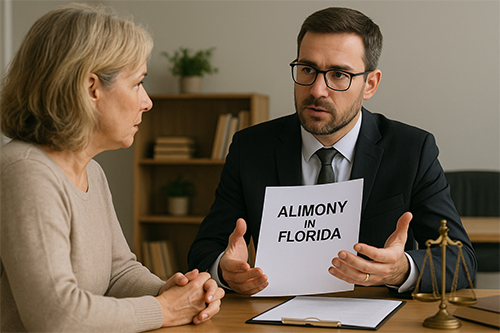Alimony
Bradenton, Lakewood Ranch, Sarasota and Venice, Florida Alimony Lawyer

When a marriage ends, it’s not just the relationship that changes— it’s your day-to-day stability, your home life, and your financial future. For many people, alimony becomes one of the most contested and confusing parts of the divorce process. You may be unsure if you’ll be able to support yourself or frustrated by the idea of being forced to pay support that feels unfair. Either way, this is a situation that calls for strength, clarity, and experienced legal help. At the Law Offices of Matthew Z. Martell, P.A., we’ve worked with individuals across Bradenton, Lakewood Ranch, Sarasota, and Venice, Florida who felt overwhelmed, pressured, or caught off guard by the legal side of divorce. Our divorce attorney bring years of experience and a deep understanding of Florida law to every case—providing steady guidance and strong advocacy when you need it most. In the article below, we share important insights about alimony law in Manatee County and Sarasota County, the legal options that may be available to you, and how a skilled Bradenton, Sarasota, and Venice, Florida alimony lawyer can help you take control of your next steps.
Who Qualifies For Alimony In Florida 
Florida Law That Governs Alimony — Florida Statutes § 61.08 explains how judges decide who gets alimony and what kind. This law gives the court the power to award different types of alimony based on one spouse’s need and the other’s ability to pay. The court does not automatically grant alimony—you have to prove that you either need it or are being asked to pay it unfairly. Judges look at things like your income, length of the marriage, age, health, education, and what kind of life you had during the marriage.
Marriage Length Matters — How long you were married plays a big role in your alimony rights. Florida breaks marriages down into three types: short-term (under 10 years), moderate-term (10 to under 20 years), and long-term (20 years or more). Courts are more likely to award alimony in moderate and long-term marriages, especially if one spouse depended heavily on the other financially. If you were only married a few years, it’s harder— but not impossible— to get financial support.
Financial Need And Ability To Pay — The judge looks at both spouses’ money situations before deciding on alimony. If you’re asking for alimony, you need to show that you truly can’t meet your basic needs without it. If you’re the one being asked to pay, the court checks if you realistically can without putting yourself in financial trouble. It’s not just about what you earn right now— they’ll also consider your assets, debts, and overall lifestyle.
Standard Of Living During The Marriage — The court tries to keep both spouses close to the life they had while married. While there’s certainly no guarantee you’ll keep the exact same lifestyle, judges consider what kind of life you and your spouse had together. That includes where you lived, how much you traveled, who paid for what, and if one of you stayed home to raise kids. The goal is to avoid one spouse being left in a drastically worse financial situation than the other.
Fault Doesn’t Normally Count — Bad behavior usually doesn’t affect whether alimony is awarded. Florida is a “no-fault” divorce state, so things like cheating usually don’t really matter when it comes to deciding alimony. That said, if a spouse intentionally wasted money or assets during the marriage (called “marital waste”) on cash, gifts, jewelry, expensive dinners, vacations, etc. on their girlfriend or boyfriend, then the court may factor that in when deciding if alimony for purposes of clawing back your ½ of those marital funds.
What Types Of Alimony Are Available In Florida
Florida’s New Alimony Law — As of July 1, 2023, permanent alimony is no longer an option under Florida Statutes § 61.08. The updated law removed permanent alimony entirely. This means you can no longer count on getting support for life, no matter how long the marriage lasted. Instead, there are four other types of alimony a judge can order, each for specific reasons and timeframes.
Temporary Alimony — Support you can get while your divorce is still ongoing. Also called “pendente lite” alimony, this type is designed to keep things stable until the divorce is finalized. If you can’t cover basic bills or living expenses while the case is in progress, the court might order your spouse to pay temporary alimony. Once the divorce is over, this type ends and may be replaced with another form.
Bridge-The-Gap Alimony — Short-term help to get you through the transition to single life. This kind of alimony is limited to two years and can’t be extended or changed. It’s meant to help with specific needs—like securing housing or covering moving costs—while you shift from married life to independence. You can’t ask for a modification later, even if circumstances change.
Rehabilitative Alimony — Helps you get back on your feet with job training or education. If you need time and support to become self-sufficient, the court may award rehabilitative alimony. You’ll need to present a clear written plan showing what training, school, or career steps you’re taking. This type of alimony ends when the plan is completed, or if you don’t follow through with it. It lasts no more than 6 years.
Durational Alimony — Provides support for a set period of time after the divorce. Durational alimony is based on the length of the marriage. For example, if your marriage lasted 12 years, your alimony cannot go beyond 12 years. Courts typically use this when other above-referenced forms of alimony don’t apply but there’s still a need for financial help. It can be modified or ended only if there’s a major change in circumstances, such as job loss or retirement.
Limits On Duration — Florida’s new law sets strict time caps on alimony based on how long you were married. Under the updated law, durational alimony can’t last more than:
- 50% of the length of a short-term marriage
- 60% of the length of a moderate-term marriage
- 75% of the length of a long-term marriage
The court may only go beyond these limits in “exceptional circumstances,” and those must be proven clearly.
Modifying Or Ending Alimony — Most types can be changed, but not all. Bridge-the-gap alimony can’t be touched after it’s ordered. The others—rehabilitative, durational, and temporary—can be modified or terminated if something big changes in either spouse’s life. For example, if your ex-spouse gets remarried or starts living with a new partner in a supportive relationship, that could be grounds to reduce or stop payments.
How Alimony Is Calculated In Bradenton, Sarasota, and Venice, Florida Courthouses
No Set Formula Under Florida Law — Florida doesn’t have a completely fixed formula or exact calculator for alimony like it does for child support. Instead, under Florida Statutes § 61.08, the court looks at one spouse’s need for alimony and the other spouse’s ability to pay. Judges use their discretion to evaluate relevant financial factors, which can make outcomes vary from case to case. That’s why presenting clear and accurate financial information is so important.
Key Things The Court Considers — The judge will first look at your length of marriage and both of your current net monthly incomes. Then, they look at your income sources such as interest income, dividend income, business income, and rental income. Next, they will consider your past and current monthly living expenses; and the standard of living during the marriage. The court also will look at age, physical and emotional health, and how long it might take for a spouse who earns less money to become independent financially. A short marriage (under 10 years) might not result in any alimony at all unless there’s a unique hardship. On the other hand, a longer marriage (17+ years) might lead to a longer and/or larger alimony award.
Why Documentation Is Critical — You’ll need to submit a sworn financial affidavit and back it up with real financial documents—things like pay stubs, tax returns, mortgage or rent statements, and monthly bills. If you’re self-employed or your income varies, you’ll need even more detailed records to show your real financial picture. Any errors or omissions can seriously damage your credibility in court.
The Role Of Lifestyle Analysis And Expert Witness Help — Judges also pay attention to the lifestyle you both had while married. If one spouse stayed home while the other built a career, the court might award enough support to maintain a reasonably similar lifestyle. Sometimes, forensic accountants are brought in to analyze spending habits or hidden income. They can help your lawyer build a much stronger case, especially when the other spouse isn’t being fully transparent.
How To Protect Yourself If You’re Asked To Pay Alimony
If you’re at risk of paying alimony in Florida, your first step should be assessing your financial limits. Create a full, accurate snapshot of your income, debts, and obligations to show what you can reasonably afford. If your spouse overstates their needs or underuses their earning capacity, your attorney can challenge those claims using Florida Statutes § 61.08. Florida’s 2023 legal reforms eliminate permanent alimony and encourage defined durations, so ask for firm limits, and if possible, negotiate manageable terms like lump-sum alimony payment in high-net worth divorces if you personally have a large amount of liquid assets solely in your name. Also, including language for future modification gives you flexibility if your financial circumstances change.
What Should You Do If You Want To Request Alimony?
If you believe you need alimony, focus on building a case that clearly shows why financial support is fair and necessary. Florida courts weigh your current financial shortfall, your ex’s resources, and the standard of living during the marriage. Be ready with records of expenses and a plan for regaining financial independence—especially if you’re seeking rehabilitative alimony under Florida Statutes § 61.08. If you’re separated and the divorce has been filed, request temporary alimony under Florida Statutes § 61.071 to help cover essentials during the divorce. Above all, be truthful and strategic—courts value good faith, and early legal advice can help you avoid mistakes that might weaken your claim.
 Can You Change an Existing Alimony Order in Florida?
Can You Change an Existing Alimony Order in Florida?
Substantial Change In Circumstances — You can only change an alimony order in Florida if there’s been a major shift in either person’s situation. That means something big and ongoing, like a serious drop in income, long-term illness, retirement, or if the person receiving alimony starts living in a serious relationship with someone who’s helping pay their expenses. Temporary changes usually don’t count. Florida Statutes § 61.14 allows either party to ask the court to modify or terminate alimony if the above-referenced kind of substantial changes happen.
Retirement, Job Loss, Or Remarriage — These are some of the most common reasons people ask for a change in alimony. If the person paying alimony retires at his or her typical Social Security full retirement age and with reduced income, the court may consider lowering or ending payments. If the paying spouse gets fired or takes a lower-paying job not by choice, the court might grant a change—though voluntary underemployment doesn’t usually help your case. Remarriage by the person receiving alimony almost always ends alimony if it’s bridge-the-gap or durational alimony. If they’re just cohabiting, you still may be able to get a change, but it depends on the facts.
Filing A Request To Modify Alimony — You must file a formal petition with the court that issued your original divorce judgment. This is not automatic. You have to explain what’s changed, show proof, and ask the judge for a specific outcome. Sometimes both sides agree to a modification and file a joint request. Other times, it turns into a full hearing. Florida law requires real evidence, not just general complaints or assumptions.
Getting A Bradenton, Sarasota, and Venice, Florida Alimony Lawyer To Help — Trying to change alimony on your own is risky, especially if the other side has a family law lawyer. You’ll need to understand Florida’s legal standards and collect documents like tax returns, medical records, or job notices. A trust and experienced Bradenton, Lakewood Ranch, Sarasota, and Venice, Florida alimony lawyer knows what local judges expect and how to build your legal argument in the clearest and most effective way.
What Happens If Your Ex Stops Paying Alimony?
If your ex stops paying alimony, Florida law—specifically Florida Statutes § 61.14— allows you to take legal action through a motion for contempt and/or a motion for enforcement. You’ll need solid proof of missed payments, so keep detailed records and communications. If the court finds your ex willfully refused to pay, they can impose penalties like wage garnishment, fines, or even eventually possibly a brief visit to jail. You can also request enforcement tools such as income withholding or even property liens eventually. Delaying action can weaken your case, so don’t ignore the issue. A Bradenton, Lakewood Ranch, Sarasota, and Venice, Florida alimony lawyer near you like Attorney Matt Martell can help you act quickly, protect your rights, and recover what you’re legally owed under Florida’s enforcement rules.
What Do Florida Alimony Lawyers Do?
Explain Florida Alimony Laws — A Bradenton, Lakewood Ranch, Sarasota, and Venice, Florida alimony lawyer near you helps you understand your rights under Florida Statutes § 61.08, which guides courts in awarding alimony. Whether you’re requesting or contesting support, your divorce lawyer interprets the statute’s impact on your case.
Offer Local Legal Insight — Well reviewed and trusted Sarasota, Bradenton, Lakewood Ranch, and Venice, Florida alimony attorneys like divorce lawyer Matthew Z. Martell bring experience with local judges, giving you realistic advice based on how alimony rulings typically play out in your specific court. This local insight leads to better strategy and preparation.
Build a Case With Evidence — Florida doesn’t use an exact formula for alimony. Your divorce lawyer compiles key data—marriage length, financials, lifestyle—to argue for or against support. Clear documentation is critical to proving need or disproving excess.
Negotiate or Litigate for Fairness — Many cases settle out of court. A skilled Florida alimony lawyer works toward a fair resolution in mediation but is ready to argue your case in court if necessary—always protecting your legal interests.
Manage Deadlines and Forms — Florida family courts are strict. Your divorce lawyer handles all filings, disclosures, and court schedules so nothing is missed—ensuring your case proceeds smoothly and by the book.
Should You Hire A Bradenton, Lakewood Ranch, Venice, FL and Sarasota Alimony Attorney For Your Case?
Hiring a Bradenton, Lakewood Ranch, Venice, FL and Sarasota alimony attorney is often necessary to protect your financial future, especially with Florida’s complex and recently updated alimony laws. Even small missteps—like filing errors or poorly worded agreements—can have long-term consequences. If alimony is on the table, having legal counsel early helps you avoid signing something unfair or missing key opportunities to strengthen your position. Whether you’re initiating a divorce or responding to one, a trusted family law attorney experienced in alimony matters near you like divorce lawyer Matt Martell can help ensure your interests are represented from the start. In most cases, the risks of going without a lawyer far outweigh the cost of hiring one—especially in Manatee County and Sarasota County family law courts.
How To Get Started With Your Manatee County or Sarasota County, Florida Alimony Consultation
At your Lakewood Ranch alimony consultation, you’ll meet with divorce Attorney Matt Martell who listens to your situation and explains your options clearly. This is your chance to ask questions whether you’re unsure about paying or requesting financial support. Bring documents that show your income, expenses, assets, and debts— like pay stubs, tax returns, bank statements, and any court orders if the divorce has already been filed. Writing down your legal goals and concerns ahead of time can help you feel more prepared. Be honest about your finances so divorce lawyer Matthew Z. Martell can give accurate advice.














































































